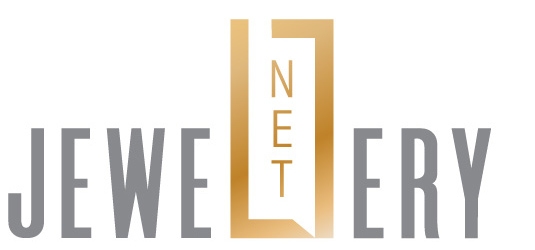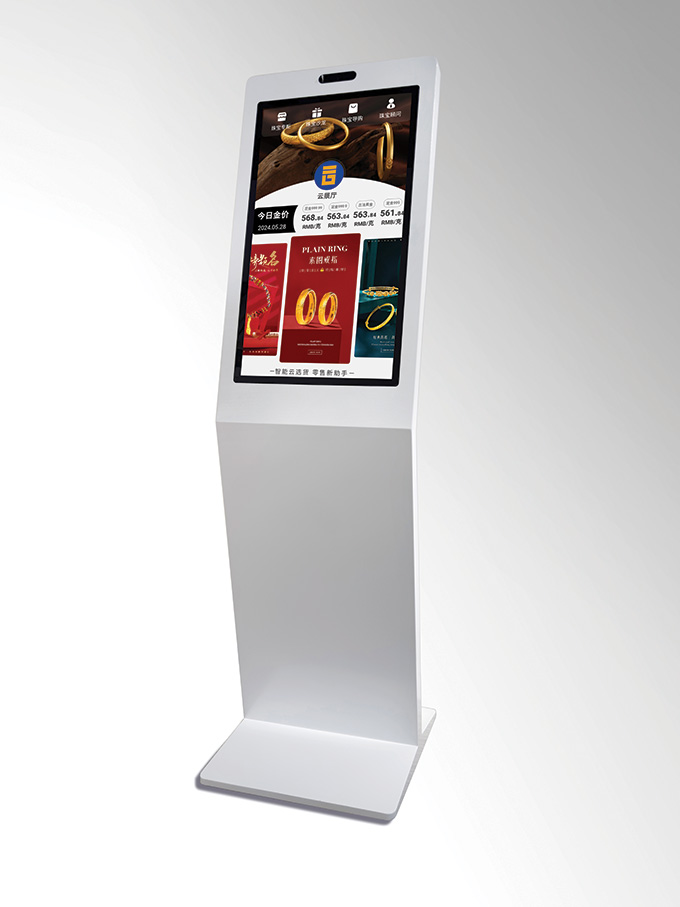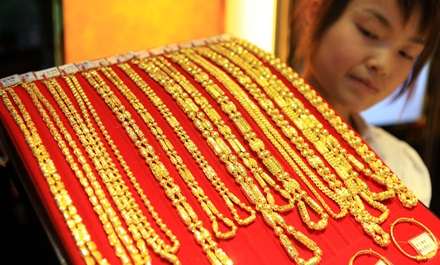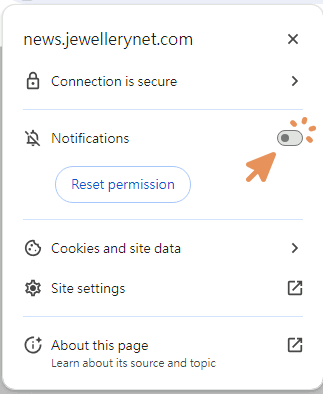Gold Wharf Group traverses B2B and B2C boundaries with its Cloud Showroom platform that expands its wholesale reach while providing retailers with real-time access to inventory, experiential tools and an online presence.
This article first appeared in the JNA July/August 2024 issue.
Chinese jewellery manufacturer and wholesaler Gold Wharf Group ticks all the boxes for growth and innovation with its Cloud Showroom platform, which integrates the traditional B2B wholesale model with an innovative B2C retail-facing component for jewellery retailers.
Cloud Showroom makes Gold Wharf’s jewellery products available to a larger clientele, both at its own jewellery shops and at those of retail partners. At the same time, the platform enables brick-and-mortar stores to increase their jewellery offerings for their customers and establish an online presence.
Peter Cheung, vice president of Gold Wharf Group, said, “Our system provides retailers with a suite of services to facilitate omnichannel strategies, gain incremental revenue and add experiential elements in traditional physical stores.”
Established in 2008, Gold Wharf Group focuses on the manufacture and wholesale of gold jewellery and operates its own stores in Fujian province, where it maintains its headquarters. It also produces silver jewellery under the 7 Degree Legend brand, which boasts nearly 2,000 outlets in China.
Shenzhen Gold Wharf Jewelry Co Ltd handles wholesale operations and counts nearly 10,000 companies in China as clients, while Shenzhen Gold Wharf Cloud Showroom Technology Co Ltd operates the new project.
Smart marketplace
Combining Internet-of-Things, artificial intelligence and cloud-based warehousing software, the Cloud Showroom platform comprises a trio of tools – a large-screen interactive display, a management app and an e-commerce channel – for intelligent retail management, strategic distribution and effective client outreach online.
The smart touchscreen display can showcase the entire assortment of Gold Wharf’s jewellery products, which currently stands in the tens of thousands and ranges from 5D, 5G and 3D gold jewellery to pure gold items and silver jewellery pieces.
Retailers can place the two-metre-tall display stand in their physical stores for their customers to browse and place orders, essentially obtaining an expansive selection of additional products to sell but without incurring inventory costs.
The management app enables them to tailor the interface, prices, categories, promotions, branding elements and other features to their own brand or branch, as well as order products, manage inventories and restock items. It likewise features engaging and immersive tools such as Image Genie that lets users search for similar products by sharing images of a preferred item.
Retailers can also classify products for special and themed promotions; highlight delivery deals such as same-day delivery for orders placed before a certain time; and drive traffic through sweepstakes and games.
Data analytics functions, meanwhile, improve conversion rates by generating sales and stock reports, analysing purchases and proffering valuable insights on customer behaviour, among others.
In addition, the Cloud Showroom account comes with a dedicated WeChat mini programme that, in effect, provides the retailer with e-commerce capabilities.
“Millennial and Gen Z consumers now prefer to shop online, but a lot of traditional retailers still lack digital expertise. With the WeChat mini programme, they can offer their curated inventory to younger customers, effectively widening their pool of clients through their own online storefront,” Cheung shared.
B2B for B2C
Despite the consumer-facing interface, Gold Wharf maintains a strictly B2B role in the platform, according to Cheung. All products are presented as the retailers’ and can be included in their own collections and private labels. And all orders, deliveries and restocking take place on a wholesale level between Gold Wharf and the client.
Cheung remarked, “At no point in the transaction do we have any dealings with the retailers’ customers. The store chooses the products, curates them and sets the prices and margins. We are simply their suppliers, sending them the orders generated in their account.”
In many ways, the business strategy is akin to online shopping cart integration with access to real-time inventory but in an online-to-offline scenario, with both parties receiving significant gains out of the partnership, he added. Gold Wharf enjoys greater exposure and distribution of its jewellery products, while brick-and-mortar stores get to expand their offerings and earn on sales without keeping stock or investing in merchandise. The platform also accommodates small orders, accepting even one-piece minimums.
Distribution network
Initially rolled out in September 2023, Cloud Showroom display stands have been installed in some 100 jewellery stores in China, including but not limited to Gold Wharf stores. Cheung said the goal is to have 3,000 clients across 100 Chinese cities by end-2024. The screens will also eventually be available in all 7 Degree Legend outlets.
“The possibilities are endless. We can potentially have the platform in 10,000 stores. All Gold Wharf owned-and-operated stores have been equipped with the display, so further installations would be in 7 Degree Legend outlets and non-Gold Wharf shops,” said Cheung. “In the future, the Cloud Showroom display stands may even be placed in non-jewellery stores such as fashion stores, clothing boutiques and bridal shops through cross-industry alliances.”
According to the company official, a three-year contract for the use of Cloud Showroom in China costs from RMB 3,000 (around US$414) to RMB 8,000 (around US$1,104), depending on the required equipment. Aside from the large display screens, the package can also include tablets configured to the platform.
While Cloud Showroom only carries Gold Wharf jewellery products at present, the group plans to leverage its strengths in the supply chain to integrate more third-party offerings in the system.
Global ambitions
The international market likewise presents golden opportunities. Cheung has identified two approaches to exporting the Cloud Showroom business model overseas. The first involves retailers outside China showcasing Gold Wharf jewellery products in the Cloud Showroom platform to sell to the Chinese population in their local market. The second is working with suppliers, distributors and jewellery wholesalers wishing to replicate the concept in their country.
“We have the technology and expertise to set up the system for wholesalers overseas that wish to expand their distribution through retail stores. The concept is ideal for markets with plenty of smaller, traditional brick-and-mortar stores that do not want to make huge investments in stock and inventory,” Cheung explained, adding that the platform can be adapted to local regulations and fulfilment conditions.
While the current system is configured for WeChat, Gold Wharf is exploring how to integrate other social, messaging and e-commerce applications to provide the online-store capability outside of China.
Cheung said, “Aside from growing our own wholesale business, our objective is really to empower smaller retailers and help them thrive in a competitive business environment. By engaging customers through additional product selections, special promotions and campaigns and interactive features, they can cater to new and younger consumer segments while managing their business efficiently without huge capital outlays.”











